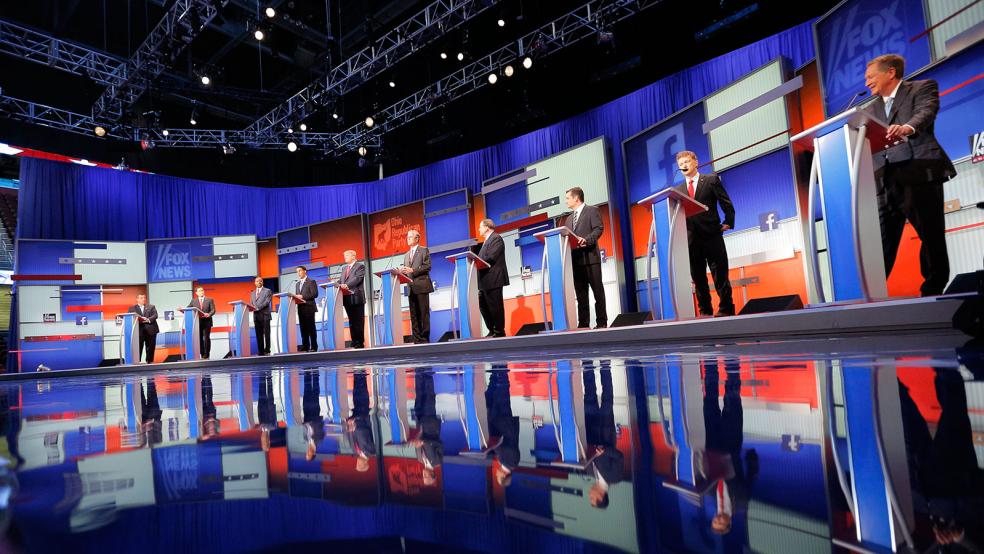Former Sen. Rick Santorum of Pennsylvania gets agitated when political analysts question why he is still in the race for the GOP presidential nomination when he is scoring less than 2 percent in the polls and has barely raised $1 million in campaign funds – a pittance compared with many of his rivals.
He notes that when he ran for president last time, he had little money and low single-digit standing in the polls in January 2012 – just before he went on to beat Mitt Romney in the Iowa caucuses.
Related: While Trump Whirls and Rages, Cruz Stays the Course
This time, Santorum is so far behind the large Republican presidential field that the Pennsylvania Republican will be lucky to make it past the Iowa caucuses next January. With a record 17 Republicans seeking the 2016 presidential nomination – currently headed by real estate tycoon Donald Trump – the winnowing process is likely to begin soon.
In the wake of last Thursday’s stormy, doubled-barreled GOP presidential debates, two of the contenders – Sen. Rand Paul of Kentucky and former Texas Gov. Rick Perry -- appear to be losing altitude.
Perry’ presidential campaign is running out of money and has stopped paying his campaign staff. The former governor is attempting to make amends for his inept and gaffe-prone presidential bid in 2012, but he hasn’t been able to catch on with conservatives. He didn’t qualify for the top-ten debate and was relegated to the group of seven lesser lights – a secondary debate that most thought was won by former Hewlett-Packard CEO Carly Fiorina.
Related: Trump--What Doesn’t Kill Him Makes Him Stronger
Paul, the libertarian who promised to be a “different kind of Republican” more willing to reach out to minorities and other non-traditional Republican voters, has also had trouble raising money and is doing poorly in the polls. Although Paul tried to gain attention in the Thursday debate by sharply questioning Trump’s party loyalty, he barely registered in a national tracking poll by the Morning Consult. More alarmingly, he registered a mere 3 percent in a Public Policy Polling survey of Iowa voters – tied with Ohio Gov. John Kasich, but far behind Trump, former neuro-surgeon Ben Carson, Wisconsin Gov. Scott Walker, former Florida governor Jeb Bush, Sen. Ted Cruz of Texas and even Fiorina.
While neither politician has given any hint that he intends to drop out anytime soon, Perry and Paul are certainly among the candidates with targets on their backs.
Related: The Biggest Obstacle to Rand Paul’s 2016 Campaign
“The old rule was campaigns don't end; the money just runs out. But in a field of 17, there's a widespread desire for early winnowing, even if the money hasn't run out,” said Larry J. Sabato, a University of Virginia political scientist.
So who will be first to be voted off the island? Besides Perry, Paul and Santorum, there are a few others on the short list.
Former New York governor George Pataki and former Virginia governor Jim Gilmore essentially are waging vanity campaigns that have attracted little if any money and that literally register zero in national polling. They may hang around for a while, but will be campaigning on a shoestring.
Related: Lindsey Graham Calls for Surge of 10,000 U.S. Troops in Iraq
Sen. Lindsey Graham of South Carolina is another candidate who has attracted less than one percent in cumulative national polling, although he has done far better than Pataki, Gilmore and Santorum in overall fundraising.
Still, there are a number of factors that may mitigate against an early exit. For one thing, with so large a field, a candidate such as Santorum can legitimately argue that the difference between his 12th place showing with 1.5 percent of the vote and Ted Cruz’s 6th place showing with 5.8 percent is a statistical error in the cumulative vote.
Moreover, with so many of the candidates now blessed with the support of Super PACs, those supposedly “independent” political organizations can bolster a campaign that is struggling to raise money on its own. For instance, the three pro-Perry Super PACS have nearly $10 million at their disposal and can use it to target key states with advertising and a ground organization.





